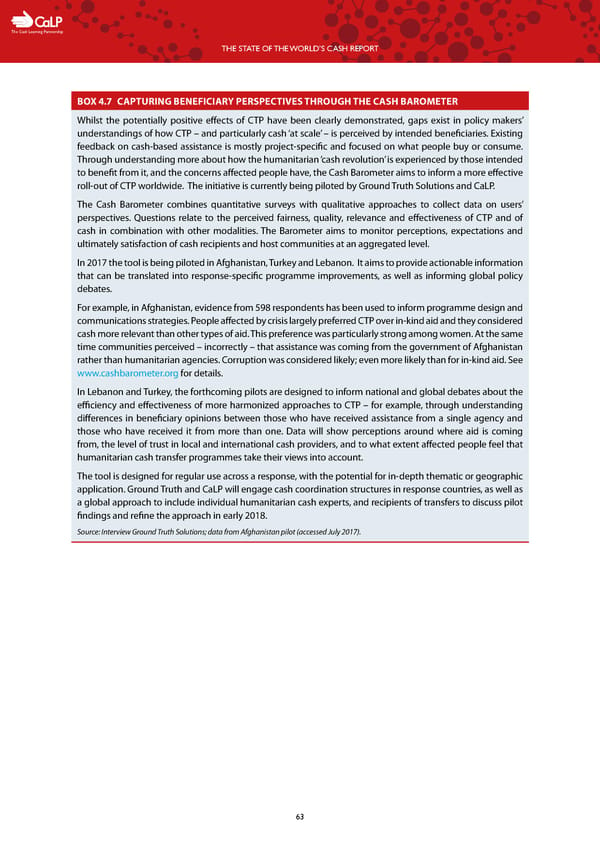C The Cash Learning Partnership THE STATE OF THE WORLD’S CASH REPORT BOX 4.7 CAPTURING BENEFICIARY PERSPECTIVES THROUGH THE CASH BAROMETER Whilst the potentially positive effects of CTP have been clearly demonstrated, gaps exist in policy makers’ understandings of how CTP – and particularly cash ‘at scale’ – is perceived by intended beneficiaries. Existing feedback on cash-based assistance is mostly project-specific and focused on what people buy or consume. Through understanding more about how the humanitarian ‘cash revolution’ is experienced by those intended to benefit from it, and the concerns affected people have, the Cash Barometer aims to inform a more effective roll-out of CTP worldwide. The initiative is currently being piloted by Ground Truth Solutions and CaLP. The Cash Barometer combines quantitative surveys with qualitative approaches to collect data on users’ perspectives. Questions relate to the perceived fairness, quality, relevance and effectiveness of CTP and of cash in combination with other modalities. The Barometer aims to monitor perceptions, expectations and ultimately satisfaction of cash recipients and host communities at an aggregated level. In 2017 the tool is being piloted in Afghanistan, Turkey and Lebanon. It aims to provide actionable information that can be translated into response-specific programme improvements, as well as informing global policy debates. For example, in Afghanistan, evidence from 598 respondents has been used to inform programme design and communications strategies. People affected by crisis largely preferred CTP over in-kind aid and they considered cash more relevant than other types of aid. This preference was particularly strong among women. At the same time communities perceived – incorrectly – that assistance was coming from the government of Afghanistan rather than humanitarian agencies. Corruption was considered likely; even more likely than for in-kind aid. See www.cashbarometer.org for details. In Lebanon and Turkey, the forthcoming pilots are designed to inform national and global debates about the efficiency and effectiveness of more harmonized approaches to CTP – for example, through understanding differences in beneficiary opinions between those who have received assistance from a single agency and those who have received it from more than one. Data will show perceptions around where aid is coming from, the level of trust in local and international cash providers, and to what extent affected people feel that humanitarian cash transfer programmes take their views into account. The tool is designed for regular use across a response, with the potential for in-depth thematic or geographic application. Ground Truth and CaLP will engage cash coordination structures in response countries, as well as a global approach to include individual humanitarian cash experts, and recipients of transfers to discuss pilot findings and refine the approach in early 2018. Source: Interview Ground Truth Solutions; data from Afghanistan pilot (accessed July 2017). 63
 The State of the World's Cash | Full Report Page 64 Page 66
The State of the World's Cash | Full Report Page 64 Page 66